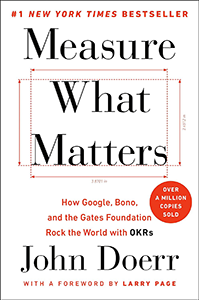Measure What Matters
“Measure What Matters: How Google, Bono, and the Gates Foundation Rock the World with OKRs” is a management book written by John Doerr, a venture capitalist who introduced the concept of Objectives and Key Results (OKRs) to Google and other successful companies. Here’s a summary of the key themes and insights from the book:
Key Themes:
1. Objectives and Key Results (OKRs):
– The core concept of the book revolves around OKRs, a goal-setting framework that helps organizations define clear objectives and track measurable outcomes. OKRs consist of ambitious objectives that define what needs to be achieved and key results that measure progress towards those objectives.
2. Implementation at Google:
– John Doerr initially introduced OKRs to Google when it was a young startup, and the framework played a significant role in Google’s rapid growth and success. The book discusses how OKRs helped Google maintain focus, align teams, and drive innovation across the organization.
3. Application in Diverse Organizations:
– “Measure What Matters” explores how OKRs have been adopted by a wide range of organizations, from tech giants like Intel and Google to non-profits like the Gates Foundation and humanitarian initiatives led by Bono. It showcases how OKRs can be tailored to different organizational cultures and objectives.
4. Benefits of OKRs:
– The book highlights the benefits of OKRs, including fostering transparency, promoting accountability, empowering employees, and driving continuous improvement. It emphasizes the importance of setting ambitious yet achievable goals that inspire and challenge teams to perform at their best.
5. Leadership and Cultural Impact:
– John Doerr shares insights into leadership practices that support effective OKR implementation, including fostering a growth mindset, encouraging experimentation, and celebrating both successes and failures as learning opportunities. The book emphasizes the role of leadership in championing OKRs and embedding them into organizational culture.
6. Case Studies and Examples:
– Throughout the book, Doerr provides case studies and real-world examples of organizations that have successfully implemented OKRs. These examples illustrate how OKRs can drive strategic alignment, boost productivity, and accelerate growth in diverse industry sectors.
Key Insights:
– Focus and Alignment: OKRs help organizations align their efforts towards common goals and priorities, ensuring that everyone is working towards the same objectives.
– Measurement and Accountability: By defining measurable key results, OKRs provide clarity on progress and accountability for outcomes, fostering a results-driven culture.
– Adaptability and Continuous Improvement: OKRs encourage teams to adapt goals based on changing circumstances and insights gained from ongoing evaluation, promoting agility and responsiveness.
Conclusion:
“Measure What Matters” by John Doerr is a practical guide to implementing the OKR framework in organizations of all sizes and industries. It offers valuable insights into goal-setting practices that have been proven effective by leading companies and non-profits around the world. The book serves as a resource for business leaders, managers, and teams seeking to enhance performance, drive innovation, and achieve meaningful results through strategic goal-setting and measurement.

